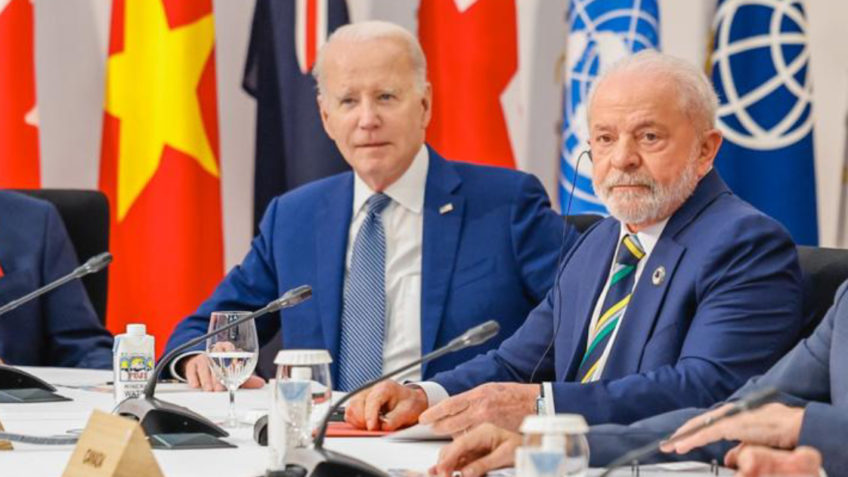
In Japan for the G7 meeting, the Brazilian president participates in 3 debates and has at least 7 bilateral meetings
President Luiz Inácio Lula da Silva (PT) participated early this Saturday (20.May.2023) in his 1st debate as a guest of this edition of the G7, held in Hiroshima, Japan.
On a panel with the theme “Working together to address multiple crises including food, health, development and gender”, Lula said that the G20 “it will be even more effective” if there is “more adequate representation of African countries”. Here is the full text of the speech (248 KB).
He also called for reform of the UN Security Council (United Nations) with the inclusion of new permanent members. Without this, according to the PT, the organization “will not recover the effectiveness, political and moral authority to deal with the conflicts and dilemmas of the 21st century”.
“It makes no sense to call on emerging countries to contribute to solving the ‘multiple crises’ that the world is facing without their legitimate concerns being addressed, and without them being adequately represented in the main bodies of global governance”, said Lula.
“A more democratic world in decision-making that affects everyone is the best guarantee of peace, sustainable development, the rights of the most vulnerable and protection of the planet”, he concluded.
Read the full text of the PT’s speech below.

World leaders in debate at the G7 summit
BILATERAL MEETINGS
Lula arrived in Japan on Thursday (May 18, 2023). On Friday (May 19), she met with the Prime Minister of Australia, Anthony Albanese, of Japan, Fumio Kishida, and with the President of Indonesia, Joko Widodo.
This Saturday (May 20), the Chief Executive met with the President of France, Emmanuel Macron, with the Director General of the IMF (International Monetary Fund), Kristalina Georgieva, and with the Prime Minister of Germany, Olaf Scholz.
Read the list of meetings scheduled for Sunday (May 21):
There is also the expectation of a meeting between Lula and the president of Ukraine, Volodymyr Zelensky. The invitation was made by the Ukrainian government, but Brazil has not yet given a conclusive answer. US President Joe Biden also hopes to meet with the Brazilian leader.
Bilateral meetings are negotiated and confirmed according to the agendas of the heads of state and government.
At the G7 summit, Lula has already participated in 2 debate sessions. They were held between dawn and this Saturday morning (May 20). The 3rd and last one takes place at dawn on Sunday (May 22), local time in Hiroshima.
Also on Sunday, the president will visit the Hiroshima Peace Memorial Park to pay tribute to the victims of the nuclear attack on the city during World War II, and will hold a meeting with business conglomerates and a Japanese financing bank.
read more:
In meetings during the summit, leaders discussed the war in Ukraine, inflationary dynamics in the world’s main economies, ways to address the vulnerabilities of low- and middle-income countries due to the debt crisis and ways to accelerate actions aimed at climate change and the energy transition.
G7
The G7 (Group of 7) is made up of some of the largest economies in the world: Germany, Canada, the United States, France, Italy, Japan and the United Kingdom.
Country representatives and guests are gathering for the summit this weekend in Hiroshima, Japan. In addition to Brazil, leaders from Australia, Comoros, South Korea, Cook Islands, India, Indonesia and Vietnam were also called to this edition of the event, in addition to Ukrainian President Volodymyr Zelensky.
In this edition, the war in Ukraine will be one of the main subjects of the event. Also on the agenda: the inflationary dynamics in the main economies of the world, ways to face the vulnerabilities of low- and middle-income countries due to the debt crisis and ways to accelerate actions aimed at climate change and energy transition, among other issues. .
FULL OF LULA’S SPEECH
Read the president’s speech at the G7 debate:
“I want to thank Prime Minister Kishida for inviting Brazil to participate in the expanded segment of the Hiroshima Summit.
This is the 7th time I have been invited to a G-7 meeting.
“When I was here for the last time, at the L’Aquila Summit in 2009, we were facing a global financial crisis of catastrophic proportions, which led to the creation of the G-20 and exposed the fragility of the dogmas and mistakes of neoliberalism.
“The reforming impetus of that moment was insufficient to correct the excesses of market deregulation and the apology of the minimal State.
“The global financial architecture has changed little and the foundations of new economic governance have not been laid.
“There were important setbacks, such as the weakening of the multilateral trading system. The protectionism of rich countries gained strength and the World Trade Organization remains paralyzed. Nobody remembers the Development Round.
“The challenges piled up and got worse. With each threat we fail to face, we generate new urgencies.
“The world today is experiencing the overlapping of multiple crises: the Covid-19 pandemic, climate change, geopolitical tensions, a war in the heart of Europe, pressures on food and energy security and threats to democracy.
“To face these threats, there needs to be a change of mentality. It is necessary to debunk myths and abandon paradigms that have collapsed.
“The global financial system has to be at the service of production, work and employment. We will only have real sustainable growth directing efforts and resources towards the real economy.
“The foreign indebtedness of many countries, which victimized Brazil in the past and today devastates Argentina, is the cause of blatant and growing inequality, and requires a treatment from the International Monetary Fund that considers the social consequences of adjustment policies.
“Unemployment, poverty, hunger, environmental degradation, pandemics and all forms of inequality and discrimination are problems that demand socially responsible responses.
“This task is only possible with a State that induces public policies aimed at guaranteeing fundamental rights and collective well-being.
“A State that promotes the ecological and energy transition, green industry and infrastructure.
“The false dichotomy between growth and protection of the environment should be over by now. The fight against hunger, poverty and inequality must return to the center of the international agenda, ensuring adequate financing and technology transfer.
“We already have a multilaterally agreed compass for this: the 2030 Agenda.
“Let us not be under any illusions. No country can face today’s systemic threats alone.
“The solution does not lie in the formation of antagonistic blocs or responses that include only a small number of countries.
“This will be particularly important in this context of transition to a multipolar order, which will require profound changes in institutions.
Our decisions will only be legitimate and effective if taken and implemented democratically.
“It makes no sense to call on emerging countries to contribute to solving the “multiple crises” that the world is facing without their legitimate concerns being addressed, and without them being adequately represented in the main bodies of global governance.
“The consolidation of the G-20 as the main space for international economic consultation was an undeniable advance. It will be even more effective with a composition that dialogues with the demands and interests of all regions of the world. This implies more adequate representation of African countries.
“Coalitions are not an end in themselves, and serve to leverage initiatives in plural spaces such as the UN system and its partner organizations.
“Without reform of its Security Council, with the inclusion of new permanent members, the UN will not regain the effectiveness, political and moral authority to deal with the conflicts and dilemmas of the 21st century.
“A more democratic world in decision-making that affects everyone is the best guarantee of peace, sustainable development, the rights of the most vulnerable and the protection of the planet.
“Before it’s too late.
“Thank you very much.”
Read more about the G7 summit:
Source: https://www.poder360.com.br/governo/lula-pede-reforma-do-conselho-de-seguranca-da-onu-e-africa-no-g20/

